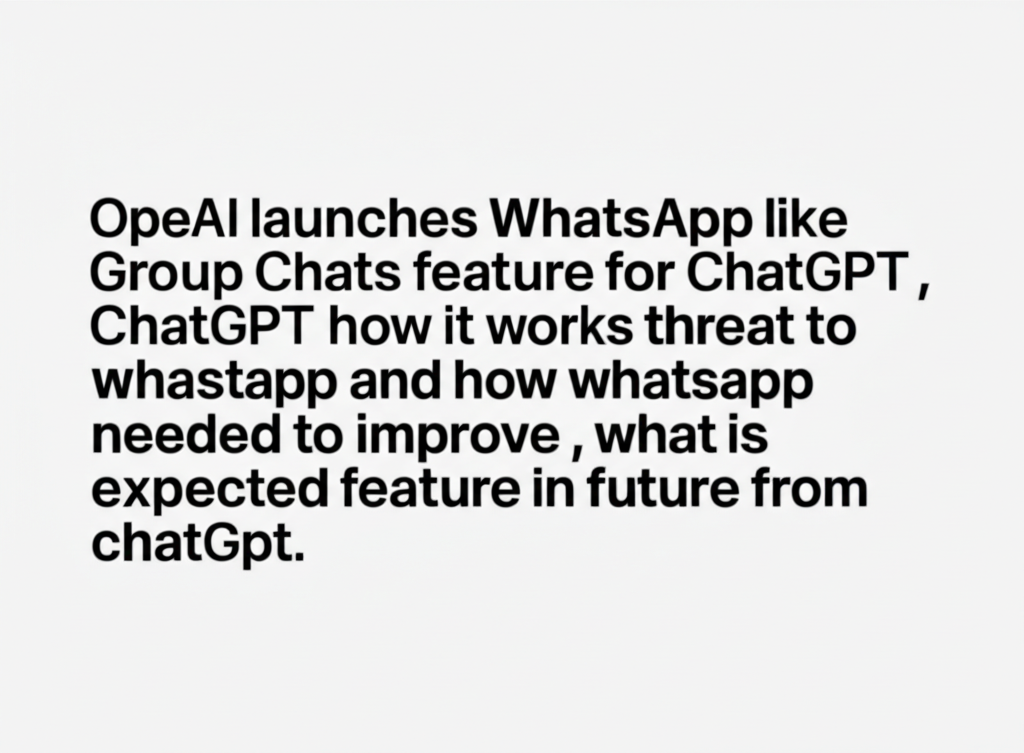The landscape of digital collaboration and messaging is undergoing a significant transformation with OpenAI's latest innovation: the piloting of group chat functionality within ChatGPT. This move is not merely an incremental update; it represents a strategic pivot towards embedding advanced conversational AI directly into multi-user workflows, potentially redefining how teams and individuals interact with artificial intelligence. As reported by Engadget, this feature allows several participants to engage with a single ChatGPT instance, summoning the chatbot for assistance by simply mentioning “ChatGPT” in the conversation.
The introduction of group chats positions ChatGPT as a more integrated collaborative tool, moving beyond its traditional one-on-one interaction model. This functionality is designed to streamline shared tasks such as planning a vacation, selecting a restaurant, or conducting research for school or work projects, as highlighted by Stocktwits. The implications for existing communication platforms, particularly those like WhatsApp that dominate personal and group messaging, are substantial, necessitating a closer examination of competitive dynamics and future developments in AI-powered communication.
Operational Mechanics: How ChatGPT's Group Chats Work
OpenAI has engineered the group chat feature to integrate seamlessly into existing conversational flows. When a user wishes to involve others, ChatGPT facilitates this by creating a copy of the ongoing conversation, initiating a new group chat. This ensures the original conversation remains separate and private, as detailed by OpenAI. Users can invite between one and twenty people to a new group chat by simply sharing a link, making the process of expanding collaboration straightforward and efficient.
A key operational aspect is ChatGPT's learned ability to follow the context of group conversations. According to Engadget, the AI is designed to discern when to remain silent and when to contribute, although participants retain the ability to explicitly call upon the chatbot by mentioning “ChatGPT.” This intelligent participation aims to prevent conversational clutter while ensuring the AI's assistance is always readily available. This sophisticated contextual understanding is vital for effective multi-party human-AI interaction.
The feature extends OpenAI's commitment to enhancing collaborative productivity. In mid-2025, OpenAI also introduced “Projects record mode,” which allows ChatGPT to capture, organize, and recall multi-step workflows across extended conversations. This enables users to create structured threads with goals, progress notes, to-dos, and reference materials, and to navigate effortlessly between sections using commands. This advanced functionality further solidifies ChatGPT’s utility in complex, long-term collaborative projects, where sharing and co-editing of “Projects” with teammates is now possible, as noted by AIMultiple.
Competitive Implications for WhatsApp and the Messaging Landscape
The advent of ChatGPT's group chat feature introduces a new dimension of competition for established messaging platforms, most notably WhatsApp. While WhatsApp boasts a massive user base and robust end-to-end encryption for privacy, its core functionality remains human-to-human communication, with AI integration primarily focused on business interactions. In 2024, WhatsApp Business indeed introduced AI-powered marketing, free service conversations, and new pricing models, solidifying its position for enterprises, according to Openmind Networks. However, this is largely distinct from AI-driven collaborative task execution within group chats.
The threat from ChatGPT lies in its ability to offer intelligent assistance directly within group discussions, making it a functional participant rather than just a communication channel. For tasks requiring quick research, idea generation, or data analysis (as demonstrated by Moderna's use of ChatGPT Enterprise for advanced data analysis, per OpenAI), ChatGPT's integrated AI could offer a more efficient solution than a purely human group chat in WhatsApp. Currently, Team-GPT rates ChatGPT's team collaboration at 6/10, indicating room for improvement, but the direction is clear.
WhatsApp's necessary improvements will hinge on deeper and more versatile AI integration. While concerns about data privacy and encryption are paramount, particularly when AI processes conversational data, future iterations of WhatsApp might need to explore AI companions that can offer similar on-demand assistance within personal and group chats without compromising user privacy. The fear of going through something like ChatGPT without encryption is a real user concern, as noted in a Reddit discussion about securely analyzing WhatsApp conversations with AI. To compete, WhatsApp could leverage its existing infrastructure to introduce AI features that summarize conversations, suggest relevant information, or even help organize tasks, all while maintaining its strong privacy stance.
The AI chatbots segment dominated the conversational AI market share in 2024, driven by a rising demand for AI-powered customer support and integration with messaging services, according to Fortune Business Insights. This trend underscores the increasing expectation for AI capabilities within communication platforms.
Anticipated Future Developments for ChatGPT's Collaborative Tools
Looking ahead, OpenAI's roadmap for ChatGPT indicates a relentless pursuit of innovation, with collaborative tools at the forefront. The primary focus, as articulated by Sam Altman, CEO of OpenAI, includes making the GPT-4 model faster and more affordable, while the future also holds the anticipated release of GPT-5. Beyond foundational model improvements, the Kellogg School of Management highlighted expected enhancements in multimodal interaction, customization, accuracy, integration, and bias mitigation. These areas are crucial for improving ChatGPT's utility in dynamic group environments.
Further advancements are expected in how ChatGPT handles complex, multi-step tasks within collaborative settings. The "Projects record mode" feature introduced in mid-2025 by OpenAI (as per AIMultiple) is a precursor to more sophisticated project management capabilities directly integrated into conversations. This could involve AI proactively suggesting workflows, summarizing discussions for new members, identifying action items, and even generating initial drafts for shared documents or presentations based on group inputs.
The integration of ChatGPT with other productivity platforms via custom GPTs is another area poised for expansion. This will allow group chats to seamlessly leverage specialized AI functionalities, such as advanced data analysis, competitive research (including SWOT analysis, 4 Ps of marketing, and sentiment analysis, as detailed by Peerbie and Reddit prompts), or content generation, making the AI an even more indispensable team member. As OpenAI's revenue is forecasted to exceed USD 1 billion in 2024 (Enterprise Apps Today), the company has significant resources to invest in these ambitious development plans.
While concerns regarding critical thinking and creativity, as well as the environmental impact of AI, persist (USA Today), the trend towards AI integration into daily life is undeniable. The evolution of ChatGPT's collaborative features underscores a future where AI is not just a tool for individual productivity but a central component of group dynamics, continuously adapting to human interaction patterns and evolving communication needs. The rapid pace of innovation suggests that what began as a simple chatbot will soon be a fundamental layer of the digital workspace and personal collaboration.










